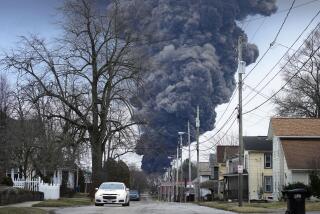EPA Study Bolsters Case Against Dioxin
- Share via
WASHINGTON — The Environmental Protection Agency has concluded in a long-awaited study that dioxin--a class of potent chemical compounds that works its way into fish, meat and dairy products--probably causes cancer in humans.
The 2,000-page EPA report, which is to be released Tuesday and is the EPA’s strongest statement about the cancer threat of dioxins, reinforces a tentative conclusion the EPA reached in 1985. The new study stops just short of labeling dioxin a known carcinogen. Making that determination calls for more study on human exposure levels, an EPA official said.
The EPA study estimates that dioxin and related compounds are responsible for between one in 1,000 and one in 10,000 of all cancers, according to the study. The most common cancer presumed to be associated with exposure to dioxin is lung cancer.
The study, which is subject to 120 days of public comment and a peer review, said that most adverse effects from dioxin occur at a level 10 to 100 times that to which most Americans are exposed.
Although dioxin first came to public attention as a contaminant in the controversial herbicide Agent Orange used in the Vietnam War, 99% of known dioxin emissions in the United States now come as a byproduct of incineration of medical and municipal waste that contains some form of chlorine.
One government source familiar with the study cautioned against overreaction: “At this point, we are not recommending that the American public change any dietary habits as a result of this study. If there are any actions to be taken, they will probably be on the part of the federal government.”
One step is the EPA’s plan to request that industry and environmental organizations submit all data they have about the release of dioxin in the United States or about the exposure of the American population to the chemical.
While helping to resolve the debate over dioxin’s health effects, the EPA study is likely to fuel another public battle about what should be done to protect the American public from the dangers of dioxin.
The EPA already has more than 30 different controls on dioxin, including restrictions on its presence in herbicides and requirements that it be cleaned from toxic waste dumps.
The pulp and paper industry already severely limits the use of chlorine in paper manufacturing, a response to concerns about the health effects of dioxin.
The study found that dioxin levels in most Americans have been declining in recent years.
EPA officials declined to comment before official release of the study.
More to Read
Sign up for Essential California
The most important California stories and recommendations in your inbox every morning.
You may occasionally receive promotional content from the Los Angeles Times.













